北师大版(2019) 必修三Unit 9 Learning Grammar课件(93张ppt)
文档属性
| 名称 | 北师大版(2019) 必修三Unit 9 Learning Grammar课件(93张ppt) | 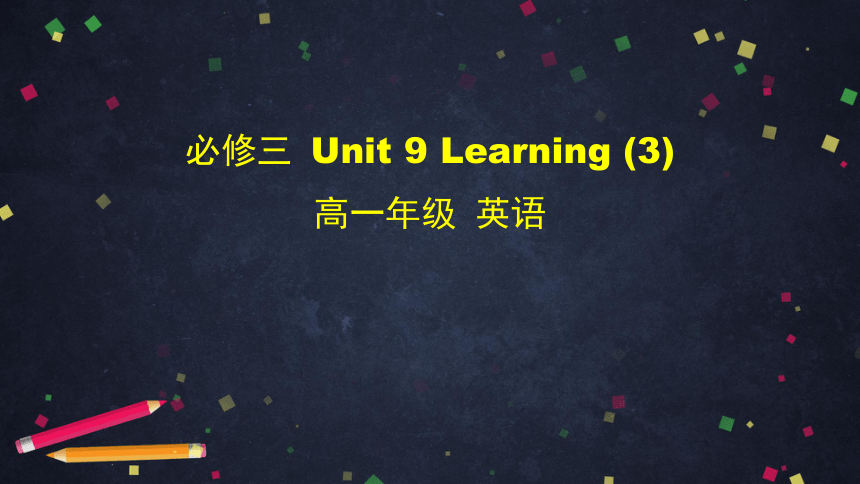 | |
| 格式 | zip | ||
| 文件大小 | 1.9MB | ||
| 资源类型 | 教案 | ||
| 版本资源 | 北师大版(2019) | ||
| 科目 | 英语 | ||
| 更新时间 | 2020-06-21 19:46:28 | ||
图片预览

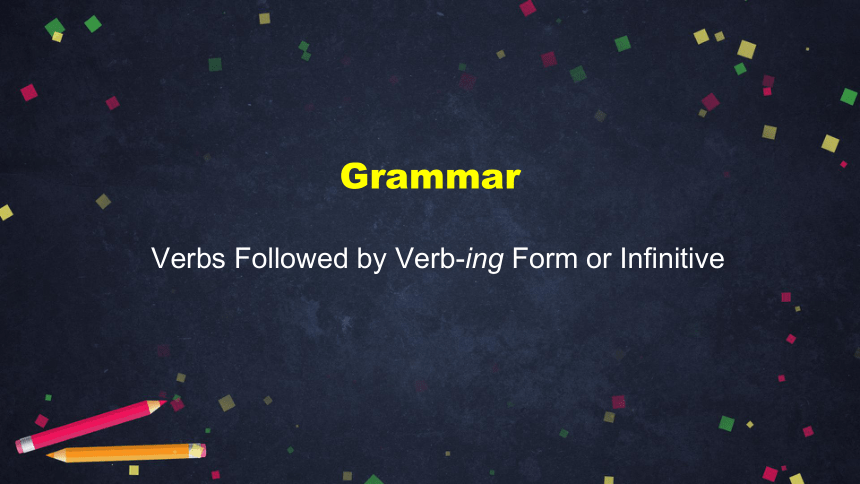

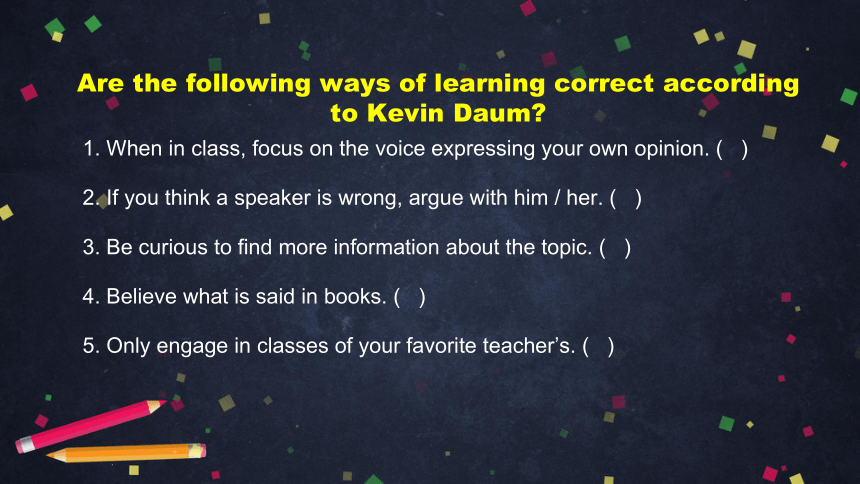
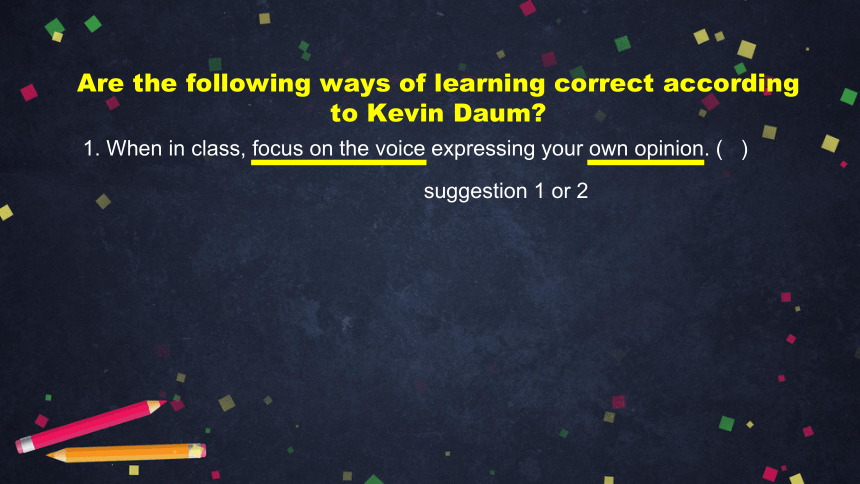
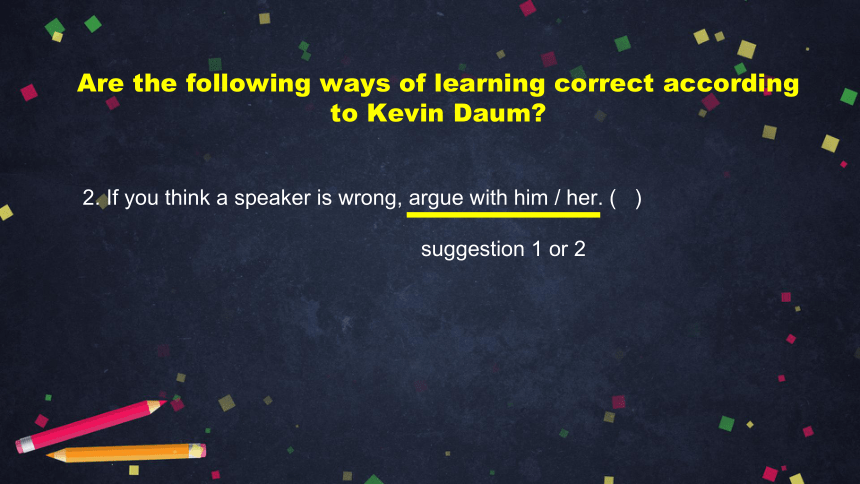
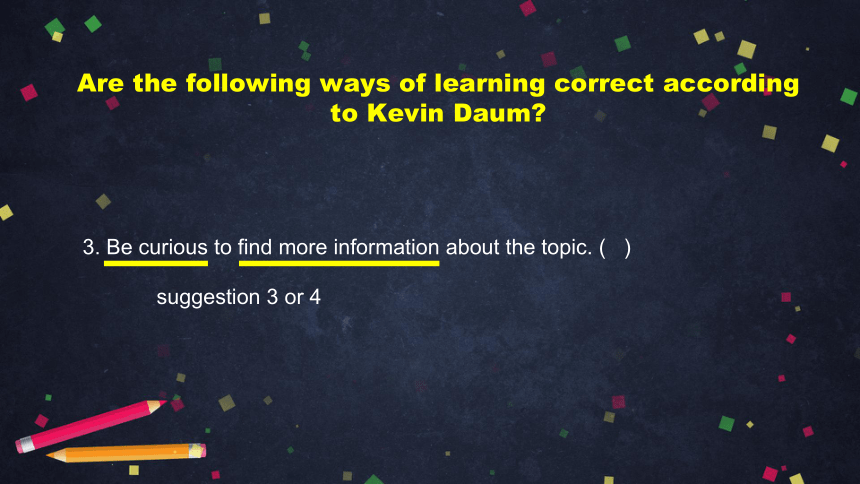
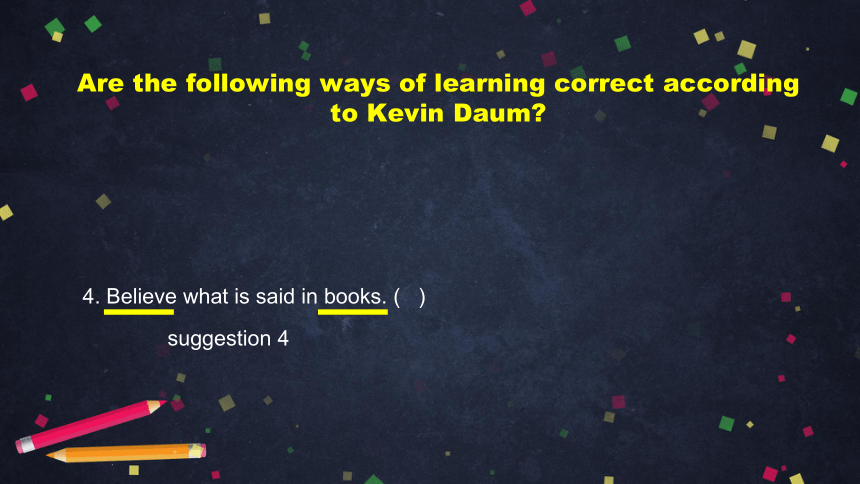
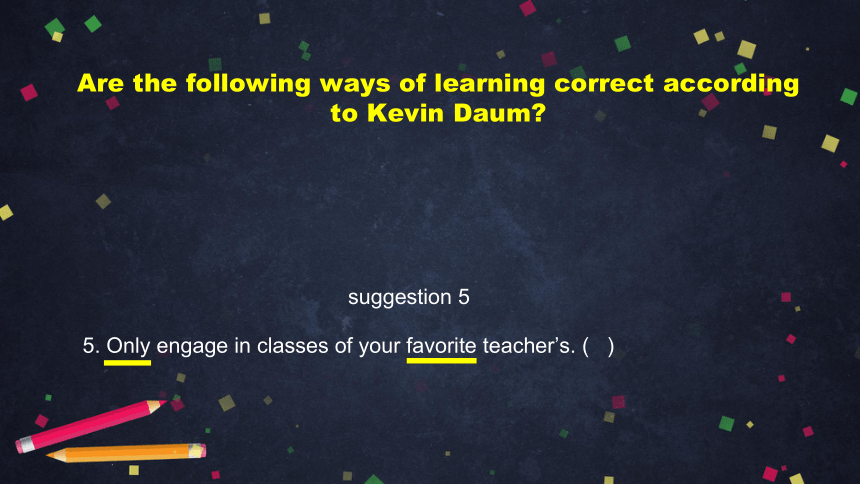
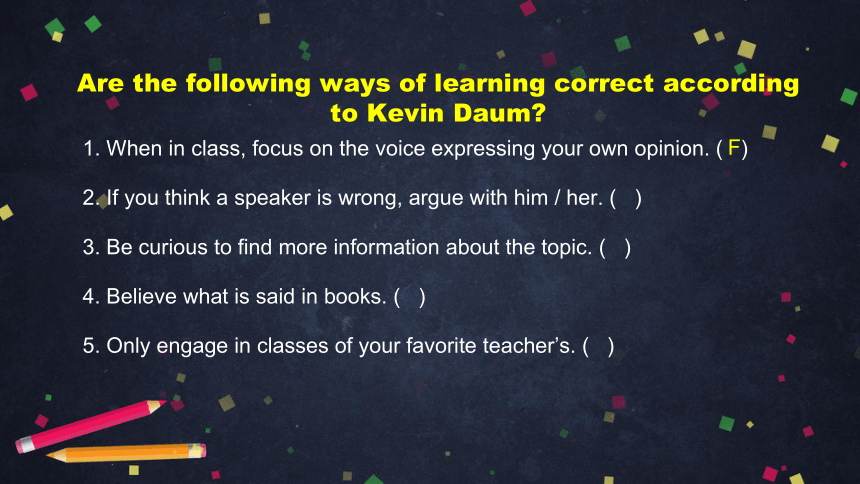
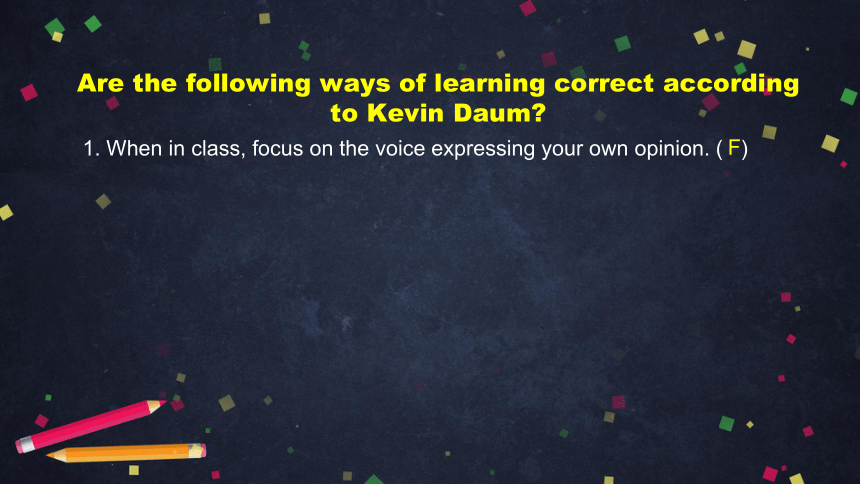
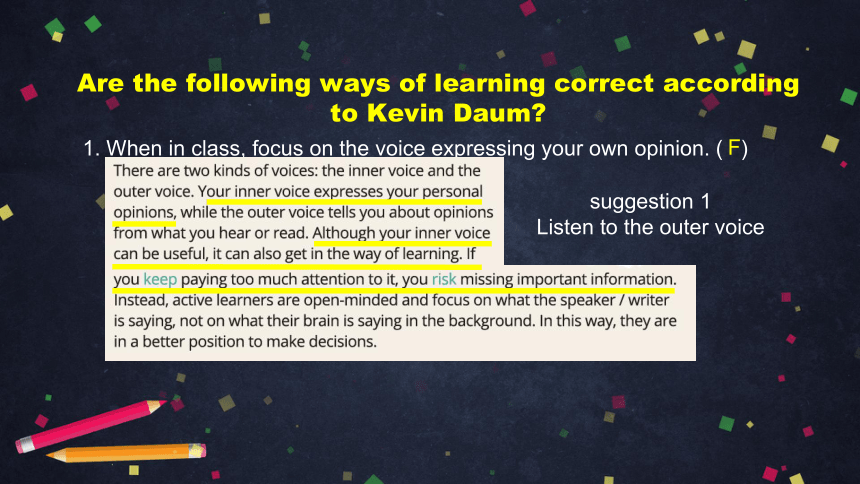
文档简介
(共93张PPT)
必修三
Unit
9
Learning
(3)
高一年级
英语
Grammar
Verbs
Followed
by
Verb-ing
Form
or
Infinitive
Review
:
Five
suggestions
for
active
learning
1.
Listen
to
the
outer
voice
2.
Argue
with
your
inner
voice
3.
Ask
questions
4.
Get
to
the
truth
5.
Focus
on
the
message
Are
the
following
ways
of
learning
correct
according
to
Kevin
Daum?
1.
When
in
class,
focus
on
the
voice
expressing
your
own
opinion.
(
)
2.
If
you
think
a
speaker
is
wrong,
argue
with
him
/
her.
(
)
3.
Be
curious
to
find
more
information
about
the
topic.
(
)
4.
Believe
what
is
said
in
books.
(
)
5.
Only
engage
in
classes
of
your
favorite
teacher’s.
(
)
Are
the
following
ways
of
learning
correct
according
to
Kevin
Daum?
1.
When
in
class,
focus
on
the
voice
expressing
your
own
opinion.
(
)
suggestion
1
or
2
Are
the
following
ways
of
learning
correct
according
to
Kevin
Daum?
2.
If
you
think
a
speaker
is
wrong,
argue
with
him
/
her.
(
)
suggestion
1
or
2
Are
the
following
ways
of
learning
correct
according
to
Kevin
Daum?
3.
Be
curious
to
find
more
information
about
the
topic.
(
)
suggestion
3
or
4
Are
the
following
ways
of
learning
correct
according
to
Kevin
Daum?
4.
Believe
what
is
said
in
books.
(
)
suggestion
4
Are
the
following
ways
of
learning
correct
according
to
Kevin
Daum?
5.
Only
engage
in
classes
of
your
favorite
teacher’s.
(
)
suggestion
5
Are
the
following
ways
of
learning
correct
according
to
Kevin
Daum?
1.
When
in
class,
focus
on
the
voice
expressing
your
own
opinion.
(
)
2.
If
you
think
a
speaker
is
wrong,
argue
with
him
/
her.
(
)
3.
Be
curious
to
find
more
information
about
the
topic.
(
)
4.
Believe
what
is
said
in
books.
(
)
5.
Only
engage
in
classes
of
your
favorite
teacher’s.
(
)
F
Are
the
following
ways
of
learning
correct
according
to
Kevin
Daum?
1.
When
in
class,
focus
on
the
voice
expressing
your
own
opinion.
(
)
F
Are
the
following
ways
of
learning
correct
according
to
Kevin
Daum?
1.
When
in
class,
focus
on
the
voice
expressing
your
own
opinion.
(
)
F
suggestion
1
Listen
to
the
outer
voice
Are
the
following
ways
of
learning
correct
according
to
Kevin
Daum?
1.
When
in
class,
focus
on
the
voice
expressing
your
own
opinion.
(
)
2.
If
you
think
a
speaker
is
wrong,
argue
with
him
/
her.
(
)
3.
Be
curious
to
find
more
information
about
the
topic.
(
)
4.
Believe
what
is
said
in
books.
(
)
5.
Only
engage
in
classes
of
your
favorite
teacher’s.
(
)
F
F
Are
the
following
ways
of
learning
correct
according
to
Kevin
Daum?
2.
If
you
think
a
speaker
is
wrong,
argue
with
him
/
her.
(
)
F
Are
the
following
ways
of
learning
correct
according
to
Kevin
Daum?
2.
If
you
think
a
speaker
is
wrong,
argue
with
him
/
her.
(
)
F
suggestion
2
Argue
with
your
inner
voice
Are
the
following
ways
of
learning
correct
according
to
Kevin
Daum?
1.
When
in
class,
focus
on
the
voice
expressing
your
own
opinion.
(
)
2.
If
you
think
a
speaker
is
wrong,
argue
with
him
/
her.
(
)
3.
Be
curious
to
find
more
information
about
the
topic.
(
)
4.
Believe
what
is
said
in
books.
(
)
5.
Only
engage
in
classes
of
your
favorite
teacher’s.
(
)
F
F
T
Are
the
following
ways
of
learning
correct
according
to
Kevin
Daum?
3.
Be
curious
to
find
more
information
about
the
topic.
(
)
T
Are
the
following
ways
of
learning
correct
according
to
Kevin
Daum?
3.
Be
curious
to
find
more
information
about
the
topic.
(
)
T
suggestion
3
Ask
questions
Are
the
following
ways
of
learning
correct
according
to
Kevin
Daum?
1.
When
in
class,
focus
on
the
voice
expressing
your
own
opinion.
(
)
2.
If
you
think
a
speaker
is
wrong,
argue
with
him
/
her.
(
)
3.
Be
curious
to
find
more
information
about
the
topic.
(
)
4.
Believe
what
is
said
in
books.
(
)
5.
Only
engage
in
classes
of
your
favorite
teacher’s.
(
)
F
F
T
F
Are
the
following
ways
of
learning
correct
according
to
Kevin
Daum?
4.
Believe
what
is
said
in
books.
(
)
F
Are
the
following
ways
of
learning
correct
according
to
Kevin
Daum?
4.
Believe
what
is
said
in
books.
(
)
F
suggestion
4
Get
to
the
truth
Are
the
following
ways
of
learning
correct
according
to
Kevin
Daum?
1.
When
in
class,
focus
on
the
voice
expressing
your
own
opinion.
(
)
2.
If
you
think
a
speaker
is
wrong,
argue
with
him
/
her.
(
)
3.
Be
curious
to
find
more
information
about
the
topic.
(
)
4.
Believe
what
is
said
in
books.
(
)
5.
Only
engage
in
classes
of
your
favorite
teacher’s.
(
)
F
F
T
F
F
Are
the
following
ways
of
learning
correct
according
to
Kevin
Daum?
5.
Only
engage
in
classes
of
your
favorite
teacher’s.
(
)
F
Are
the
following
ways
of
learning
correct
according
to
Kevin
Daum?
5.
Only
engage
in
classes
of
your
favorite
teacher’s.
(
)
F
suggestion
5
Focus
on
the
message
Look
at
the
colored
verbs
in
the
article.
They
refuse
to
learn
or
ignore
what
is
said
because
of
who
the
speaker
/
writer
is.
It
is
true
that
we
cannot
help
disliking
some
people
—
this
is
human
nature,
after
all.
Look
at
the
colored
verbs
in
the
article.
We
need
to
train
ourselves
to
be
better
learners
—
to
actively
take
part
in
the
learning
process
and
to
reflect
on
what
we
have
learnt.
I
suggest
doing
five
things
to
take
an
active
role
in
your
learning.
Look
at
the
colored
verbs
in
the
article.
If
you
keep
paying
too
much
attention
to
it,
you
risk
missing
important
information.
Be
flexible
in
your
opinions
and
you
might
end
up
agreeing
with
the
speaker
/
writer
after
all.
Look
at
the
colored
verbs
in
the
article.
They
attempt
to
find
the
truth
at
the
heart
of
each
idea.
If
you
try
to
find
out
the
source
of
an
idea,
no
matter
how
crazy
it
seems,
you
will
increase
your
chance
of
learning
something.
Complete
the
table.
Verb
+
verb-ing
form
Verb
+
infinitive
Complete
the
table.
Verb
+
verb-ing
form
Verb
+
infinitive
suggest
doing
keep
doing
risk
doing
end
up
doing
cannot
help
doing
Complete
the
table.
Verb
+
verb-ing
form
Verb
+
infinitive
suggest
doing
keep
doing
risk
doing
end
up
doing
cannot
help
doing
need
to
do
attempt
to
do
try
to
do
refuse
to
do
Grammar
Summary
Verbs
can
be
followed
by
verb-ing
form
infinitive
advise,
agree,
avoid,
can’t
stand,
don’t
mind,
enjoy,
start,
help,
like,
manage,
practise,
regret,
seem,
remember
Verb
+
verb-ing
form
Verb
+
infinitive
advise,
agree,
avoid,
can’t
stand,
don’t
mind,
enjoy,
start,
help,
like,
manage,
practise,
regret,
seem,
remember
Verb
+
verb-ing
form
Verb
+
infinitive
advise,
agree,
avoid,
can’t
stand,
don’t
mind,
enjoy,
start,
help,
like,
manage,
practise,
regret,
seem,
remember
Verb
+
verb-ing
form
Verb
+
infinitive
agree
to
do
advise,
agree,
avoid,
can’t
stand,
don’t
mind,
enjoy,
start,
help,
like,
manage,
practise,
regret,
seem,
remember
Verb
+
verb-ing
form
Verb
+
infinitive
don’t
mind
doing
agree
to
do
advise,
agree,
avoid,
can’t
stand,
don’t
mind,
enjoy,
start,
help,
like,
manage,
practise,
regret,
seem,
remember
Verb
+
verb-ing
form
Verb
+
infinitive
don’t
mind
doing
enjoy
doing
agree
to
do
advise,
agree,
avoid,
can’t
stand,
don’t
mind,
enjoy,
start,
help,
like,
manage,
practise,
regret,
seem,
remember
Verb
+
verb-ing
form
Verb
+
infinitive
don’t
mind
doing
enjoy
doing
agree
to
do
start
to
do
advise,
agree,
avoid,
can’t
stand,
don’t
mind,
enjoy,
start,
help,
like,
manage,
practise,
regret,
seem,
remember
Verb
+
verb-ing
form
Verb
+
infinitive
don’t
mind
doing
enjoy
doing
start
doing
agree
to
do
start
to
do
advise,
agree,
avoid,
can’t
stand,
don’t
mind,
enjoy,
start,
help,
like,
manage,
practise,
regret,
seem,
remember
Verb
+
verb-ing
form
Verb
+
infinitive
don’t
mind
doing
enjoy
doing
start
doing
agree
to
do
start
to
do
help
to
do
advise,
agree,
avoid,
can’t
stand,
don’t
mind,
enjoy,
start,
help,
like,
manage,
practise,
regret,
seem,
remember
Verb
+
verb-ing
form
Verb
+
infinitive
don’t
mind
doing
enjoy
doing
start
doing
like
doing
agree
to
do
start
to
do
help
to
do
I
like
playing
the
guitar.
Although
the
guitar
is
not
my
favorite
instrument,
I
like
to
play
it
this
afternoon
for
fun.
advise,
agree,
avoid,
can’t
stand,
don’t
mind,
enjoy,
start,
help,
like,
manage,
practise,
regret,
seem,
remember
Verb
+
verb-ing
form
Verb
+
infinitive
don’t
mind
doing
enjoy
doing
start
doing
like
doing
agree
to
do
start
to
do
help
to
do
like
to
do
advise,
agree,
avoid,
can’t
stand,
don’t
mind,
enjoy,
start,
help,
like,
manage,
practise,
regret,
seem,
remember
Verb
+
verb-ing
form
Verb
+
infinitive
don’t
mind
doing
enjoy
doing
start
doing
like
doing
agree
to
do
start
to
do
help
to
do
like
to
do
manage
to
do
advise,
agree,
avoid,
can’t
stand,
don’t
mind,
enjoy,
start,
help,
like,
manage,
practise,
regret,
seem,
remember
Verb
+
verb-ing
form
Verb
+
infinitive
don’t
mind
doing
enjoy
doing
start
doing
like
doing
agree
to
do
start
to
do
help
to
do
like
to
do
manage
to
do
seem
to
do
advise,
agree,
avoid,
can’t
stand,
don’t
mind,
enjoy,
start,
help,
like,
manage,
practise,
regret,
seem,
remember
Verb
+
verb-ing
form
Verb
+
infinitive
don’t
mind
doing
enjoy
doing
start
doing
like
doing
remember
doing
agree
to
do
start
to
do
help
to
do
like
to
do
manage
to
do
seem
to
do
remember
to
do
advise,
avoid,
can’t
stand,
practise,
regret
advise,
avoid,
can’t
stand,
practise,
regret
advise:
I
advised
selling
your
car.
avoid:
Road
safety
is
taught
to
young
children
to
avoid
being
injured.
can’t
stand:
They
are
close
friends.
They
can’t
stand
being
apart.
practise:
A
good
pilot
should
practise
flying
in
various
weather
conditions
before
getting
the
license.
regret:
I
deeply
regret
saying
those
bad
words
to
you.
We
regret
to
inform
you
that
we
can’t
offer
the
job
to
you.
advise,
agree,
avoid,
can’t
stand,
don’t
mind,
enjoy,
start,
help,
like,
manage,
practise,
regret,
seem,
remember
Verb
+
verb-ing
form
Verb
+
infinitive
…
advise
doing
avoid
doing
can’t
stand
doing
practise
doing
regret
doing
…
regret
to
do
Verb
+
verb-ing
form
Verb
+
infinitive
advise
doing
avoid
doing
can’t
stand
doing
don’t
mind
doing
enjoy
doing
start
doing
practise
doing
like
doing
regret
doing
remember
doing
agree
to
do
start
to
do
help
to
do
manage
to
do
seem
to
do
like
to
do
regret
to
do
remember
to
do
Grammar
Summary
Verbs
can
be
followed
by
verb-ing
form
infinitive
either
verb-ing
form
or
infinitive
I
don’t
know
where
she
is.
Try
calling
her
on
her
cell
phone.
Verb
+
verb-ing
form
Verb
+
infinitive
…
start
doing
like
doing
regret
doing
remember
doing
…
start
to
do
like
to
do
regret
to
do
remember
to
do
Verbs
followed
by
either
verb-ing
form
or
infinitive:
(1)
have
slightly
different
meanings
or
have
the
same
meanings
(2)
are
most
commonly
followed
by
verb-ing
form,
but
can
also
be
followed
by
an
infinitive
(3)
carry
different
meanings
Verbs
followed
by
either
verb-ing
form
or
infinitive:
(1)
have
slightly
different
meanings
or
have
the
same
meanings
begin,
continue,
intend,
start
e.g.
He
started
to
build
/
building
his
own
laboratory.
What
do
you
intend
to
do
/
doing
this
weekend?
Verb
+
verb-ing
form
Verb
+
infinitive
…
start
doing
like
doing
regret
doing
remember
doing
…
start
to
do
like
to
do
regret
to
do
remember
to
do
Verbs
followed
by
either
verb-ing
form
or
infinitive:
(2)
Many
liking
or
disliking
verbs
are
most
commonly
followed
by
verb-ing
form,
but
can
also
be
followed
by
an
infinitive.
hate,
like,
love,
prefer
e.g.
I
like
swimming.
I
like
to
swim
this
afternoon
to
have
a
break.
Verb
+
verb-ing
form
Verb
+
infinitive
…
start
doing
like
doing
regret
doing
remember
doing
…
start
to
do
like
to
do
regret
to
do
remember
to
do
Verbs
followed
by
either
verb-ing
form
or
infinitive:
(3)
carry
different
meanings
remember,
forget,
try,
stop,
regret,
mean
Verbs
followed
by
either
verb-ing
form
or
infinitive:
(3)
carry
different
meanings
remember,
forget,
try,
stop,
regret,
mean
e.g.
I?remember?telling
him
not
to
do
it,
but
he
still
did
it
anyway.
Please
remember
to
lock
the
door
before
leaving.
Verbs
followed
by
either
verb-ing
form
or
infinitive:
(3)
carry
different
meanings
remember,
forget,
try,
stop,
regret,
mean
remember?doing
记得已经做过的事情
remember
to
do
没做的事情记得要去做
Verbs
followed
by
either
verb-ing
form
or
infinitive:
(3)
carry
different
meanings
remember,
forget,
try,
stop,
regret,
mean
e.g.
I?forget
posting
the
letter
and
sent
another
one
again.
He
forgot
to
pay
back
the
money
he
borrowed.
I
must
remind
him.
Verbs
followed
by
either
verb-ing
form
or
infinitive:
(3)
carry
different
meanings
remember,
forget,
try,
stop,
regret,
mean
forget?doing
忘记已经做过的事情
forget
to
do
没做的事情忘记去做
Verbs
followed
by
either
verb-ing
form
or
infinitive:
(3)
carry
different
meanings
remember,
forget,
try,
stop,
regret,
mean
e.g.
I?will
try
baking
bread
tonight.
I
hope
it’s
tasty.
I
tried
to
ring
you,
but
I
didn’t
get
through.
Verbs
followed
by
either
verb-ing
form
or
infinitive:
(3)
carry
different
meanings
remember,
forget,
try,
stop,
regret,
mean
try?doing
尝试、试着去做某事
try
to
do
努力、尽力去做某事
Verbs
followed
by
either
verb-ing
form
or
infinitive:
(3)
carry
different
meanings
remember,
forget,
try,
stop,
regret,
mean
e.g.
We
stopped
talking
because
we
heard
a
strange
noise
outside.
They
stopped
to
have
a
rest
on
the
way
driving
to
the
seaside.
Verbs
followed
by
either
verb-ing
form
or
infinitive:
(3)
carry
different
meanings
remember,
forget,
try,
stop,
regret,
mean
stop?doing
停止正在做的事情
stop
to
do
停下正在做的事去做另外一件事
Verbs
followed
by
either
verb-ing
form
or
infinitive:
(3)
carry
different
meanings
remember,
forget,
try,
stop,
regret,
mean
e.g.
Seeing
me
crying,
she
regretted
telling
me
the
bad
news.
I
regret
to
say
that
the
meeting
wasn’t
successful.
Verbs
followed
by
either
verb-ing
form
or
infinitive:
(3)
carry
different
meanings
remember,
forget,
try,
stop,
regret,
mean
regret?doing
做了某事后,感到懊悔
regret
to
do
做某事前,感到遗憾、惋惜
Verbs
followed
by
either
verb-ing
form
or
infinitive:
(3)
carry
different
meanings
remember,
forget,
try,
stop,
regret,
mean
e.g.
Success
means
working
hard.
He
says
he
never
meant
to
hurt
her.
Verbs
followed
by
either
verb-ing
form
or
infinitive:
(3)
carry
different
meanings
remember,
forget,
try,
stop,
regret,
mean
mean?doing
意味着
mean
to
do
打算做
1.
They
hate
________(be)
apart
from
each
other.
2.
She
began
______________(feel)
painful
soon
after
the
accident.
3.
Let’s
walk
on
a
bit
further
before
we
stop
_________(have)
dinner.
4.
I
didn’t
mean
__________(break)
the
vase.
5.
I
regret
__________(spend)
so
much
money
on
this
car.
I’m
running
out
of
money
now.
Complete
sentences
with
the
correct
form
of
the
verbs.
being
to
feel
/
feeling
to
have
to
break
spending
6.
To
avoid
__________(get)
stuck
in
the
traffic
jam,
we
started
early
in
the
morning
on
the
National
Day.
7.
Do
not
attempt
_____________(repair)
the
equipment
without
the
proper
tools.
8.
We
must
try
_________(get)
everything
done
in
time.
Complete
sentences
with
the
correct
form
of
the
verbs.
getting
to
repair
to
get
Complete
the
text
with
the
correct
form
of
the
verbs.
Complete
the
text
with
the
correct
form
of
the
verbs.
Recently,
I’ve
manage
____________(become)
a
more
active
learner.
When
I’m
reading
a
book
or
listening
to
my
teacher,
I
try
_________(forget)
what
I’ve
learnt
before
or
what
I
think
about
the
book
or
the
person
giving
me
the
information
and
practise
_______________(concentrate)
on
the
information
itself.
At
the
beginning,
I
found
it
difficult
to
do
this
and
I
to
become
to
forget
concentrating
Complete
the
text
with
the
correct
form
of
the
verbs.
couldn’t
help
______________(question)
the
ideas
I
was
reading
or
hearing.
But
now
I’ve
learnt
to
avoid
___________(listen)
to
my
inner
voice
all
the
time
and
sometimes
I
even
argue
with
it.
On
the
other
hand,
I
also
attempt
_______(ask)
as
many
questions
as
I
can.
I
ask
my
teachers
a
lot
of
questions
and
I’ve
noticed
that
the
answers
to
the
questions
have
really
helped
me
understand
the
topic
a
lot
better.
questioning
Hearing
the
news,
she
can’t
help
crying.
I
am
too
busy.
I
can’t
help
to
clean
the
floor
for
you.
can’t
help
clean
Complete
the
text
with
the
correct
form
of
the
verbs.
couldn’t
help
______________(question)
the
ideas
I
was
reading
or
hearing.
But
now
I’ve
learnt
to
avoid
___________(listen)
to
my
inner
voice
all
the
time
and
sometimes
I
even
argue
with
it.
On
the
other
hand,
I
also
attempt
_______(ask)
as
many
questions
as
I
can.
I
ask
my
teachers
a
lot
of
questions
and
I’ve
noticed
that
the
answers
to
the
questions
have
really
helped
me
understand
the
topic
a
lot
better.
questioning
listening
to
ask
Complete
the
table
to
make
a
summary.
Verb
+
verb-ing
form
Verb
+
infinitive
Complete
the
table
to
make
a
summary.
Verb
+
verb-ing
form
Verb
+
infinitive
practise
doing
can’t
help
doing
avoid
doing
manage
to
do
try
to
do
attempt
to
do
Complete
the
table
to
make
a
summary.
Verb
+
verb-ing
form
Verb
+
infinitive
practise
doing
avoid
doing
can’t
help
doing
try
doing
manage
to
do
attempt
to
do
can’t
help
to
do
try
to
do
Translation
1.
他拒绝为他的错误向我道歉。(refuse)
2.
我最终同意接受医生的建议。(agree)
3.
这个令人震惊的消息似乎是真的。(seem)
4.
我不想冒风险让自己走丢,所以我打算买张地图。(risk)
Translation
1.
他拒绝为他的错误向我道歉。(refuse)
He
refused
to
apologize
to
me
for
his
mistake.
2.
我最终同意接受医生的建议。(agree)
I
finally
agreed
to
take
the
doctor’s
advice.
Translation
3.
这个令人震惊的消息似乎是真的。(seem)
The
astonishing
news
seemed
to
be
true.
4.
我不想冒风险让自己走丢,所以我打算买张地图。(risk)
I
don’t
want
to
risk
getting
lost,
so
I’m
going
to
buy
a
map.
Can
you
introduce
the
“active
learning”
to
others?
1.
Listen
to
the
outer
voice.
(keep,
risk,
focus
on)
2.
Argue
with
your
inner
voice.
(think,
end
up,
agree)
3.
Ask
questions.
(promote,
lead
to)
4.
Get
to
the
truth.
(attempt,
try,
increase)
5.
Focus
on
the
message.
(refuse,
cannot
help,
judge,
separate)
Can
you
introduce
the
“active
learning”
to
others?
1.
Listen
to
the
outer
voice.
(keep,
risk,
focus
on)
If
you
keep
paying
too
much
attention
to
the
inner
voice,
you
risk
missing
important
information.
Instead,
active
learners
focus
on
what
the
speaker
/
writer
is
saying.
Can
you
introduce
the
“active
learning”
to
others?
2.
Argue
with
your
inner
voice.
(think,
end
up,
agree)
When
your
inner
voice
tells
you
a
speaker
/
writer
is
wrong,
think
about
why
they
might
be
right.
Argue
with
your
inner
voice
and
you
will
end
up
agreeing
with
the
speaker
/
writer.
Can
you
introduce
the
“active
learning”
to
others?
3.
Ask
questions.
(promote,
lead
to)
Asking
questions
is
the
easiest
way
to
promote
active
learning.
The
answers
to
your
questions
will
lead
you
to
further
learning.
Can
you
introduce
the
“active
learning”
to
others?
4.
Get
to
the
truth.
(attempt,
try,
increase)
Active
learners
attempt
to
find
the
truth
at
the
heart
of
each
idea.
If
you
try
to
find
out
the
source
of
an
idea,
no
matter
how
crazy
it
seems,
you
will
increase
your
chance
of
learning
something.
Can
you
introduce
the
“active
learning”
to
others?
5.
Focus
on
the
message.
(refuse,
cannot
help,
judge,
separate)
Many
people
refuse
to
learn
or
ignore
what
is
said
because
of
who
the
speaker
/
writer
is.
It
is
true
that
we
cannot
help
disliking
some
people.
But
active
learners
don’t
judge
people
based
on
first
impressions
or
personal
feelings.
Instead,
they
separate
the
message
from
the
messenger.
Homework
Complete
sentences
with
the
correct
form
of
the
verbs.
必修三
Unit
9
Learning
(3)
高一年级
英语
Grammar
Verbs
Followed
by
Verb-ing
Form
or
Infinitive
Review
:
Five
suggestions
for
active
learning
1.
Listen
to
the
outer
voice
2.
Argue
with
your
inner
voice
3.
Ask
questions
4.
Get
to
the
truth
5.
Focus
on
the
message
Are
the
following
ways
of
learning
correct
according
to
Kevin
Daum?
1.
When
in
class,
focus
on
the
voice
expressing
your
own
opinion.
(
)
2.
If
you
think
a
speaker
is
wrong,
argue
with
him
/
her.
(
)
3.
Be
curious
to
find
more
information
about
the
topic.
(
)
4.
Believe
what
is
said
in
books.
(
)
5.
Only
engage
in
classes
of
your
favorite
teacher’s.
(
)
Are
the
following
ways
of
learning
correct
according
to
Kevin
Daum?
1.
When
in
class,
focus
on
the
voice
expressing
your
own
opinion.
(
)
suggestion
1
or
2
Are
the
following
ways
of
learning
correct
according
to
Kevin
Daum?
2.
If
you
think
a
speaker
is
wrong,
argue
with
him
/
her.
(
)
suggestion
1
or
2
Are
the
following
ways
of
learning
correct
according
to
Kevin
Daum?
3.
Be
curious
to
find
more
information
about
the
topic.
(
)
suggestion
3
or
4
Are
the
following
ways
of
learning
correct
according
to
Kevin
Daum?
4.
Believe
what
is
said
in
books.
(
)
suggestion
4
Are
the
following
ways
of
learning
correct
according
to
Kevin
Daum?
5.
Only
engage
in
classes
of
your
favorite
teacher’s.
(
)
suggestion
5
Are
the
following
ways
of
learning
correct
according
to
Kevin
Daum?
1.
When
in
class,
focus
on
the
voice
expressing
your
own
opinion.
(
)
2.
If
you
think
a
speaker
is
wrong,
argue
with
him
/
her.
(
)
3.
Be
curious
to
find
more
information
about
the
topic.
(
)
4.
Believe
what
is
said
in
books.
(
)
5.
Only
engage
in
classes
of
your
favorite
teacher’s.
(
)
F
Are
the
following
ways
of
learning
correct
according
to
Kevin
Daum?
1.
When
in
class,
focus
on
the
voice
expressing
your
own
opinion.
(
)
F
Are
the
following
ways
of
learning
correct
according
to
Kevin
Daum?
1.
When
in
class,
focus
on
the
voice
expressing
your
own
opinion.
(
)
F
suggestion
1
Listen
to
the
outer
voice
Are
the
following
ways
of
learning
correct
according
to
Kevin
Daum?
1.
When
in
class,
focus
on
the
voice
expressing
your
own
opinion.
(
)
2.
If
you
think
a
speaker
is
wrong,
argue
with
him
/
her.
(
)
3.
Be
curious
to
find
more
information
about
the
topic.
(
)
4.
Believe
what
is
said
in
books.
(
)
5.
Only
engage
in
classes
of
your
favorite
teacher’s.
(
)
F
F
Are
the
following
ways
of
learning
correct
according
to
Kevin
Daum?
2.
If
you
think
a
speaker
is
wrong,
argue
with
him
/
her.
(
)
F
Are
the
following
ways
of
learning
correct
according
to
Kevin
Daum?
2.
If
you
think
a
speaker
is
wrong,
argue
with
him
/
her.
(
)
F
suggestion
2
Argue
with
your
inner
voice
Are
the
following
ways
of
learning
correct
according
to
Kevin
Daum?
1.
When
in
class,
focus
on
the
voice
expressing
your
own
opinion.
(
)
2.
If
you
think
a
speaker
is
wrong,
argue
with
him
/
her.
(
)
3.
Be
curious
to
find
more
information
about
the
topic.
(
)
4.
Believe
what
is
said
in
books.
(
)
5.
Only
engage
in
classes
of
your
favorite
teacher’s.
(
)
F
F
T
Are
the
following
ways
of
learning
correct
according
to
Kevin
Daum?
3.
Be
curious
to
find
more
information
about
the
topic.
(
)
T
Are
the
following
ways
of
learning
correct
according
to
Kevin
Daum?
3.
Be
curious
to
find
more
information
about
the
topic.
(
)
T
suggestion
3
Ask
questions
Are
the
following
ways
of
learning
correct
according
to
Kevin
Daum?
1.
When
in
class,
focus
on
the
voice
expressing
your
own
opinion.
(
)
2.
If
you
think
a
speaker
is
wrong,
argue
with
him
/
her.
(
)
3.
Be
curious
to
find
more
information
about
the
topic.
(
)
4.
Believe
what
is
said
in
books.
(
)
5.
Only
engage
in
classes
of
your
favorite
teacher’s.
(
)
F
F
T
F
Are
the
following
ways
of
learning
correct
according
to
Kevin
Daum?
4.
Believe
what
is
said
in
books.
(
)
F
Are
the
following
ways
of
learning
correct
according
to
Kevin
Daum?
4.
Believe
what
is
said
in
books.
(
)
F
suggestion
4
Get
to
the
truth
Are
the
following
ways
of
learning
correct
according
to
Kevin
Daum?
1.
When
in
class,
focus
on
the
voice
expressing
your
own
opinion.
(
)
2.
If
you
think
a
speaker
is
wrong,
argue
with
him
/
her.
(
)
3.
Be
curious
to
find
more
information
about
the
topic.
(
)
4.
Believe
what
is
said
in
books.
(
)
5.
Only
engage
in
classes
of
your
favorite
teacher’s.
(
)
F
F
T
F
F
Are
the
following
ways
of
learning
correct
according
to
Kevin
Daum?
5.
Only
engage
in
classes
of
your
favorite
teacher’s.
(
)
F
Are
the
following
ways
of
learning
correct
according
to
Kevin
Daum?
5.
Only
engage
in
classes
of
your
favorite
teacher’s.
(
)
F
suggestion
5
Focus
on
the
message
Look
at
the
colored
verbs
in
the
article.
They
refuse
to
learn
or
ignore
what
is
said
because
of
who
the
speaker
/
writer
is.
It
is
true
that
we
cannot
help
disliking
some
people
—
this
is
human
nature,
after
all.
Look
at
the
colored
verbs
in
the
article.
We
need
to
train
ourselves
to
be
better
learners
—
to
actively
take
part
in
the
learning
process
and
to
reflect
on
what
we
have
learnt.
I
suggest
doing
five
things
to
take
an
active
role
in
your
learning.
Look
at
the
colored
verbs
in
the
article.
If
you
keep
paying
too
much
attention
to
it,
you
risk
missing
important
information.
Be
flexible
in
your
opinions
and
you
might
end
up
agreeing
with
the
speaker
/
writer
after
all.
Look
at
the
colored
verbs
in
the
article.
They
attempt
to
find
the
truth
at
the
heart
of
each
idea.
If
you
try
to
find
out
the
source
of
an
idea,
no
matter
how
crazy
it
seems,
you
will
increase
your
chance
of
learning
something.
Complete
the
table.
Verb
+
verb-ing
form
Verb
+
infinitive
Complete
the
table.
Verb
+
verb-ing
form
Verb
+
infinitive
suggest
doing
keep
doing
risk
doing
end
up
doing
cannot
help
doing
Complete
the
table.
Verb
+
verb-ing
form
Verb
+
infinitive
suggest
doing
keep
doing
risk
doing
end
up
doing
cannot
help
doing
need
to
do
attempt
to
do
try
to
do
refuse
to
do
Grammar
Summary
Verbs
can
be
followed
by
verb-ing
form
infinitive
advise,
agree,
avoid,
can’t
stand,
don’t
mind,
enjoy,
start,
help,
like,
manage,
practise,
regret,
seem,
remember
Verb
+
verb-ing
form
Verb
+
infinitive
advise,
agree,
avoid,
can’t
stand,
don’t
mind,
enjoy,
start,
help,
like,
manage,
practise,
regret,
seem,
remember
Verb
+
verb-ing
form
Verb
+
infinitive
advise,
agree,
avoid,
can’t
stand,
don’t
mind,
enjoy,
start,
help,
like,
manage,
practise,
regret,
seem,
remember
Verb
+
verb-ing
form
Verb
+
infinitive
agree
to
do
advise,
agree,
avoid,
can’t
stand,
don’t
mind,
enjoy,
start,
help,
like,
manage,
practise,
regret,
seem,
remember
Verb
+
verb-ing
form
Verb
+
infinitive
don’t
mind
doing
agree
to
do
advise,
agree,
avoid,
can’t
stand,
don’t
mind,
enjoy,
start,
help,
like,
manage,
practise,
regret,
seem,
remember
Verb
+
verb-ing
form
Verb
+
infinitive
don’t
mind
doing
enjoy
doing
agree
to
do
advise,
agree,
avoid,
can’t
stand,
don’t
mind,
enjoy,
start,
help,
like,
manage,
practise,
regret,
seem,
remember
Verb
+
verb-ing
form
Verb
+
infinitive
don’t
mind
doing
enjoy
doing
agree
to
do
start
to
do
advise,
agree,
avoid,
can’t
stand,
don’t
mind,
enjoy,
start,
help,
like,
manage,
practise,
regret,
seem,
remember
Verb
+
verb-ing
form
Verb
+
infinitive
don’t
mind
doing
enjoy
doing
start
doing
agree
to
do
start
to
do
advise,
agree,
avoid,
can’t
stand,
don’t
mind,
enjoy,
start,
help,
like,
manage,
practise,
regret,
seem,
remember
Verb
+
verb-ing
form
Verb
+
infinitive
don’t
mind
doing
enjoy
doing
start
doing
agree
to
do
start
to
do
help
to
do
advise,
agree,
avoid,
can’t
stand,
don’t
mind,
enjoy,
start,
help,
like,
manage,
practise,
regret,
seem,
remember
Verb
+
verb-ing
form
Verb
+
infinitive
don’t
mind
doing
enjoy
doing
start
doing
like
doing
agree
to
do
start
to
do
help
to
do
I
like
playing
the
guitar.
Although
the
guitar
is
not
my
favorite
instrument,
I
like
to
play
it
this
afternoon
for
fun.
advise,
agree,
avoid,
can’t
stand,
don’t
mind,
enjoy,
start,
help,
like,
manage,
practise,
regret,
seem,
remember
Verb
+
verb-ing
form
Verb
+
infinitive
don’t
mind
doing
enjoy
doing
start
doing
like
doing
agree
to
do
start
to
do
help
to
do
like
to
do
advise,
agree,
avoid,
can’t
stand,
don’t
mind,
enjoy,
start,
help,
like,
manage,
practise,
regret,
seem,
remember
Verb
+
verb-ing
form
Verb
+
infinitive
don’t
mind
doing
enjoy
doing
start
doing
like
doing
agree
to
do
start
to
do
help
to
do
like
to
do
manage
to
do
advise,
agree,
avoid,
can’t
stand,
don’t
mind,
enjoy,
start,
help,
like,
manage,
practise,
regret,
seem,
remember
Verb
+
verb-ing
form
Verb
+
infinitive
don’t
mind
doing
enjoy
doing
start
doing
like
doing
agree
to
do
start
to
do
help
to
do
like
to
do
manage
to
do
seem
to
do
advise,
agree,
avoid,
can’t
stand,
don’t
mind,
enjoy,
start,
help,
like,
manage,
practise,
regret,
seem,
remember
Verb
+
verb-ing
form
Verb
+
infinitive
don’t
mind
doing
enjoy
doing
start
doing
like
doing
remember
doing
agree
to
do
start
to
do
help
to
do
like
to
do
manage
to
do
seem
to
do
remember
to
do
advise,
avoid,
can’t
stand,
practise,
regret
advise,
avoid,
can’t
stand,
practise,
regret
advise:
I
advised
selling
your
car.
avoid:
Road
safety
is
taught
to
young
children
to
avoid
being
injured.
can’t
stand:
They
are
close
friends.
They
can’t
stand
being
apart.
practise:
A
good
pilot
should
practise
flying
in
various
weather
conditions
before
getting
the
license.
regret:
I
deeply
regret
saying
those
bad
words
to
you.
We
regret
to
inform
you
that
we
can’t
offer
the
job
to
you.
advise,
agree,
avoid,
can’t
stand,
don’t
mind,
enjoy,
start,
help,
like,
manage,
practise,
regret,
seem,
remember
Verb
+
verb-ing
form
Verb
+
infinitive
…
advise
doing
avoid
doing
can’t
stand
doing
practise
doing
regret
doing
…
regret
to
do
Verb
+
verb-ing
form
Verb
+
infinitive
advise
doing
avoid
doing
can’t
stand
doing
don’t
mind
doing
enjoy
doing
start
doing
practise
doing
like
doing
regret
doing
remember
doing
agree
to
do
start
to
do
help
to
do
manage
to
do
seem
to
do
like
to
do
regret
to
do
remember
to
do
Grammar
Summary
Verbs
can
be
followed
by
verb-ing
form
infinitive
either
verb-ing
form
or
infinitive
I
don’t
know
where
she
is.
Try
calling
her
on
her
cell
phone.
Verb
+
verb-ing
form
Verb
+
infinitive
…
start
doing
like
doing
regret
doing
remember
doing
…
start
to
do
like
to
do
regret
to
do
remember
to
do
Verbs
followed
by
either
verb-ing
form
or
infinitive:
(1)
have
slightly
different
meanings
or
have
the
same
meanings
(2)
are
most
commonly
followed
by
verb-ing
form,
but
can
also
be
followed
by
an
infinitive
(3)
carry
different
meanings
Verbs
followed
by
either
verb-ing
form
or
infinitive:
(1)
have
slightly
different
meanings
or
have
the
same
meanings
begin,
continue,
intend,
start
e.g.
He
started
to
build
/
building
his
own
laboratory.
What
do
you
intend
to
do
/
doing
this
weekend?
Verb
+
verb-ing
form
Verb
+
infinitive
…
start
doing
like
doing
regret
doing
remember
doing
…
start
to
do
like
to
do
regret
to
do
remember
to
do
Verbs
followed
by
either
verb-ing
form
or
infinitive:
(2)
Many
liking
or
disliking
verbs
are
most
commonly
followed
by
verb-ing
form,
but
can
also
be
followed
by
an
infinitive.
hate,
like,
love,
prefer
e.g.
I
like
swimming.
I
like
to
swim
this
afternoon
to
have
a
break.
Verb
+
verb-ing
form
Verb
+
infinitive
…
start
doing
like
doing
regret
doing
remember
doing
…
start
to
do
like
to
do
regret
to
do
remember
to
do
Verbs
followed
by
either
verb-ing
form
or
infinitive:
(3)
carry
different
meanings
remember,
forget,
try,
stop,
regret,
mean
Verbs
followed
by
either
verb-ing
form
or
infinitive:
(3)
carry
different
meanings
remember,
forget,
try,
stop,
regret,
mean
e.g.
I?remember?telling
him
not
to
do
it,
but
he
still
did
it
anyway.
Please
remember
to
lock
the
door
before
leaving.
Verbs
followed
by
either
verb-ing
form
or
infinitive:
(3)
carry
different
meanings
remember,
forget,
try,
stop,
regret,
mean
remember?doing
记得已经做过的事情
remember
to
do
没做的事情记得要去做
Verbs
followed
by
either
verb-ing
form
or
infinitive:
(3)
carry
different
meanings
remember,
forget,
try,
stop,
regret,
mean
e.g.
I?forget
posting
the
letter
and
sent
another
one
again.
He
forgot
to
pay
back
the
money
he
borrowed.
I
must
remind
him.
Verbs
followed
by
either
verb-ing
form
or
infinitive:
(3)
carry
different
meanings
remember,
forget,
try,
stop,
regret,
mean
forget?doing
忘记已经做过的事情
forget
to
do
没做的事情忘记去做
Verbs
followed
by
either
verb-ing
form
or
infinitive:
(3)
carry
different
meanings
remember,
forget,
try,
stop,
regret,
mean
e.g.
I?will
try
baking
bread
tonight.
I
hope
it’s
tasty.
I
tried
to
ring
you,
but
I
didn’t
get
through.
Verbs
followed
by
either
verb-ing
form
or
infinitive:
(3)
carry
different
meanings
remember,
forget,
try,
stop,
regret,
mean
try?doing
尝试、试着去做某事
try
to
do
努力、尽力去做某事
Verbs
followed
by
either
verb-ing
form
or
infinitive:
(3)
carry
different
meanings
remember,
forget,
try,
stop,
regret,
mean
e.g.
We
stopped
talking
because
we
heard
a
strange
noise
outside.
They
stopped
to
have
a
rest
on
the
way
driving
to
the
seaside.
Verbs
followed
by
either
verb-ing
form
or
infinitive:
(3)
carry
different
meanings
remember,
forget,
try,
stop,
regret,
mean
stop?doing
停止正在做的事情
stop
to
do
停下正在做的事去做另外一件事
Verbs
followed
by
either
verb-ing
form
or
infinitive:
(3)
carry
different
meanings
remember,
forget,
try,
stop,
regret,
mean
e.g.
Seeing
me
crying,
she
regretted
telling
me
the
bad
news.
I
regret
to
say
that
the
meeting
wasn’t
successful.
Verbs
followed
by
either
verb-ing
form
or
infinitive:
(3)
carry
different
meanings
remember,
forget,
try,
stop,
regret,
mean
regret?doing
做了某事后,感到懊悔
regret
to
do
做某事前,感到遗憾、惋惜
Verbs
followed
by
either
verb-ing
form
or
infinitive:
(3)
carry
different
meanings
remember,
forget,
try,
stop,
regret,
mean
e.g.
Success
means
working
hard.
He
says
he
never
meant
to
hurt
her.
Verbs
followed
by
either
verb-ing
form
or
infinitive:
(3)
carry
different
meanings
remember,
forget,
try,
stop,
regret,
mean
mean?doing
意味着
mean
to
do
打算做
1.
They
hate
________(be)
apart
from
each
other.
2.
She
began
______________(feel)
painful
soon
after
the
accident.
3.
Let’s
walk
on
a
bit
further
before
we
stop
_________(have)
dinner.
4.
I
didn’t
mean
__________(break)
the
vase.
5.
I
regret
__________(spend)
so
much
money
on
this
car.
I’m
running
out
of
money
now.
Complete
sentences
with
the
correct
form
of
the
verbs.
being
to
feel
/
feeling
to
have
to
break
spending
6.
To
avoid
__________(get)
stuck
in
the
traffic
jam,
we
started
early
in
the
morning
on
the
National
Day.
7.
Do
not
attempt
_____________(repair)
the
equipment
without
the
proper
tools.
8.
We
must
try
_________(get)
everything
done
in
time.
Complete
sentences
with
the
correct
form
of
the
verbs.
getting
to
repair
to
get
Complete
the
text
with
the
correct
form
of
the
verbs.
Complete
the
text
with
the
correct
form
of
the
verbs.
Recently,
I’ve
manage
____________(become)
a
more
active
learner.
When
I’m
reading
a
book
or
listening
to
my
teacher,
I
try
_________(forget)
what
I’ve
learnt
before
or
what
I
think
about
the
book
or
the
person
giving
me
the
information
and
practise
_______________(concentrate)
on
the
information
itself.
At
the
beginning,
I
found
it
difficult
to
do
this
and
I
to
become
to
forget
concentrating
Complete
the
text
with
the
correct
form
of
the
verbs.
couldn’t
help
______________(question)
the
ideas
I
was
reading
or
hearing.
But
now
I’ve
learnt
to
avoid
___________(listen)
to
my
inner
voice
all
the
time
and
sometimes
I
even
argue
with
it.
On
the
other
hand,
I
also
attempt
_______(ask)
as
many
questions
as
I
can.
I
ask
my
teachers
a
lot
of
questions
and
I’ve
noticed
that
the
answers
to
the
questions
have
really
helped
me
understand
the
topic
a
lot
better.
questioning
Hearing
the
news,
she
can’t
help
crying.
I
am
too
busy.
I
can’t
help
to
clean
the
floor
for
you.
can’t
help
clean
Complete
the
text
with
the
correct
form
of
the
verbs.
couldn’t
help
______________(question)
the
ideas
I
was
reading
or
hearing.
But
now
I’ve
learnt
to
avoid
___________(listen)
to
my
inner
voice
all
the
time
and
sometimes
I
even
argue
with
it.
On
the
other
hand,
I
also
attempt
_______(ask)
as
many
questions
as
I
can.
I
ask
my
teachers
a
lot
of
questions
and
I’ve
noticed
that
the
answers
to
the
questions
have
really
helped
me
understand
the
topic
a
lot
better.
questioning
listening
to
ask
Complete
the
table
to
make
a
summary.
Verb
+
verb-ing
form
Verb
+
infinitive
Complete
the
table
to
make
a
summary.
Verb
+
verb-ing
form
Verb
+
infinitive
practise
doing
can’t
help
doing
avoid
doing
manage
to
do
try
to
do
attempt
to
do
Complete
the
table
to
make
a
summary.
Verb
+
verb-ing
form
Verb
+
infinitive
practise
doing
avoid
doing
can’t
help
doing
try
doing
manage
to
do
attempt
to
do
can’t
help
to
do
try
to
do
Translation
1.
他拒绝为他的错误向我道歉。(refuse)
2.
我最终同意接受医生的建议。(agree)
3.
这个令人震惊的消息似乎是真的。(seem)
4.
我不想冒风险让自己走丢,所以我打算买张地图。(risk)
Translation
1.
他拒绝为他的错误向我道歉。(refuse)
He
refused
to
apologize
to
me
for
his
mistake.
2.
我最终同意接受医生的建议。(agree)
I
finally
agreed
to
take
the
doctor’s
advice.
Translation
3.
这个令人震惊的消息似乎是真的。(seem)
The
astonishing
news
seemed
to
be
true.
4.
我不想冒风险让自己走丢,所以我打算买张地图。(risk)
I
don’t
want
to
risk
getting
lost,
so
I’m
going
to
buy
a
map.
Can
you
introduce
the
“active
learning”
to
others?
1.
Listen
to
the
outer
voice.
(keep,
risk,
focus
on)
2.
Argue
with
your
inner
voice.
(think,
end
up,
agree)
3.
Ask
questions.
(promote,
lead
to)
4.
Get
to
the
truth.
(attempt,
try,
increase)
5.
Focus
on
the
message.
(refuse,
cannot
help,
judge,
separate)
Can
you
introduce
the
“active
learning”
to
others?
1.
Listen
to
the
outer
voice.
(keep,
risk,
focus
on)
If
you
keep
paying
too
much
attention
to
the
inner
voice,
you
risk
missing
important
information.
Instead,
active
learners
focus
on
what
the
speaker
/
writer
is
saying.
Can
you
introduce
the
“active
learning”
to
others?
2.
Argue
with
your
inner
voice.
(think,
end
up,
agree)
When
your
inner
voice
tells
you
a
speaker
/
writer
is
wrong,
think
about
why
they
might
be
right.
Argue
with
your
inner
voice
and
you
will
end
up
agreeing
with
the
speaker
/
writer.
Can
you
introduce
the
“active
learning”
to
others?
3.
Ask
questions.
(promote,
lead
to)
Asking
questions
is
the
easiest
way
to
promote
active
learning.
The
answers
to
your
questions
will
lead
you
to
further
learning.
Can
you
introduce
the
“active
learning”
to
others?
4.
Get
to
the
truth.
(attempt,
try,
increase)
Active
learners
attempt
to
find
the
truth
at
the
heart
of
each
idea.
If
you
try
to
find
out
the
source
of
an
idea,
no
matter
how
crazy
it
seems,
you
will
increase
your
chance
of
learning
something.
Can
you
introduce
the
“active
learning”
to
others?
5.
Focus
on
the
message.
(refuse,
cannot
help,
judge,
separate)
Many
people
refuse
to
learn
or
ignore
what
is
said
because
of
who
the
speaker
/
writer
is.
It
is
true
that
we
cannot
help
disliking
some
people.
But
active
learners
don’t
judge
people
based
on
first
impressions
or
personal
feelings.
Instead,
they
separate
the
message
from
the
messenger.
Homework
Complete
sentences
with
the
correct
form
of
the
verbs.
同课章节目录
- Unit 7 Art
- Lesson 1 Masterpieces
- Lesson 2 Beijing Opera
- Lesson 3 A Musical Genius
- Unit 8 Green living
- Lesson 1 Roots and Shoots
- Lesson 2 Greening the Desert
- Lesson 3 "White Bikes" on the Road
- Unit 9 Learning
- Lesson 1 Active Learning
- Lesson 2 Language Learning Tips
- Lesson 3 The Secrets of Your Memory
